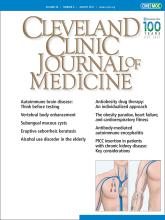Article Figures & Data
Tables
Anxiety Poor hygiene, urinary or fecal incontinence Malnutrition Confusion, memory loss, dementia, or delirium Falls Marital problems Sleep problems Depression or mood swings Financial problems Seizures (new-onset, idiopathic) Worsening of chronic medical problems (hypertension, diabetes, heart failure) ↵a Note: Crime, antisocial, and substance-seeking illegal behaviors are not common in this group.
Previous diagnosis of alcohol-use disorder Drinking patterns, physiologic dependence, withdrawals Presence of intoxication Neuropsychiatric comorbidities or manifestations including suicidal ideation Medical comorbidities and complications including chronic pain; current medications Psychosocial evaluation including housing, dietary issues, finances, legal issues, sociability, family Prior treatment, including pharmacotherapy: success, failure, relapse, participation in support groups Patient’s level of motivation to change ↵a Assessment should include screening, a thorough medical and psychosocial history, physical examination, and appropriate laboratory tests.






